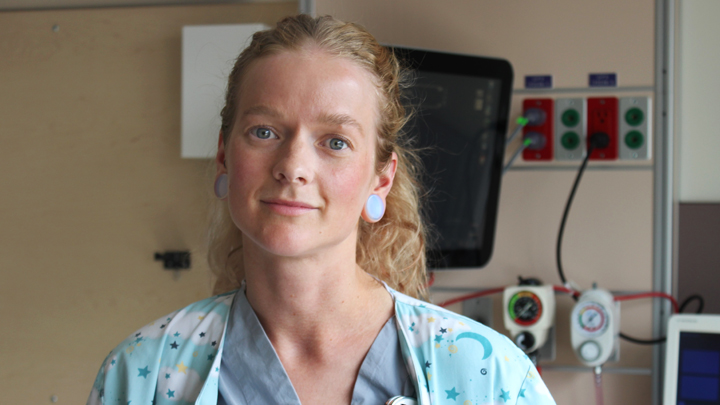
April 29, 2024

“Guiding the family — including the patient, whether that's through providing emotional support or just educating family or patients about what’s going on — is such a unique role to be in,” says Rachel Herder, who works in the Chinook Regional Hospital Intensive Care Unit. Photo by Patrick Burles.

Rachel Herder enjoys some sunshine with her husband Clay and daughter Juno. Photo supplied.
Story by Jennifer Vanderlaan | Photo by Patrick Burles
LETHBRIDGE — In the quiet of predawn, Rachel Herder, a registered nurse on the Intensive Care Unit (ICU) at Chinook Regional Hospital (CRH), readies herself for another day on the frontlines.
She gets up, slips into her scrubs and grabs a quick bite. She checks to make sure she’s packed her secret weapon — a travel mug of hot tea. She never leaves home without it.
During her 10-minute drive to work in Lethbridge, Herder reflects on her previous shift and mentally prepares herself as best she can for the unpredictability of a modern ICU.
“The ICU is where critically ill people go to get the care they need,” she says. “Adults showing up in the ICU may have breathing or heart issues, systemic infections or other serious complications.”
As her 12-hour shift begins, she’s briefed by the nurse going off shift. They discuss patient history and sum up what’s happened over the last 12 hours. Herder then plans out her day.
Nurses in the ICU spend more time with fewer patients, which allows them to better know and care for patients and their families.
“Having one to two patients allows me to keep a close eye on them because they’re at risk of getting worse very quickly,” Herder adds. “I’m also given the unique opportunity to learn about what matters most to my patients and their families and this, in many ways, guides the way that I care for the patient.”
Herder is often greeted by her patients’ families, with whom she often shares an update on their loved one’s condition, all the while conducting a full assessment — checking vitals, ensuring safety supplies are readily available and administering medications. Then it’s time for rounds.
Rounds take place at a patient’s bedside once a day, where the interdisciplinary team responsible for their care also share important information. Herder facilitates these rounds — which can include the ICU physician, pharmacist, dietitian, respiratory therapist and other team members — calling on each discipline to give their head-to-toe assessment and recommendations. They discuss everything from their physical to spiritual and emotional health.
After rounds, Herder receives a new set of care orders from the ICU physician.
“Depending on the results from the rounds, I may be instructed to continue with the current care plan or to pivot,” says Herder. “If a patient isn’t improving, or is worsening, there may also be a need to have a tough and frank conversation with the family.”
Herder finds these discussions tough at times; she’s acutely aware that the ICU can be a scary place for both patients and families. Her work entails a tremendous responsibility — and it’s one she takes as seriously as the life-and-death scenarios that surround her.
“Guiding the family — including the patient, whether that's through providing emotional support or just educating family or patients about what’s going on — is such a unique role to be in,” says Herder. “It’s special and one of the reasons I wouldn’t want to leave healthcare.” Herder says she always feels a great sense of happiness when patients emerge from a critical illness to achieve a full recovery. “That is the dream for ICU staff.”
Depending on the demands of the ICU that day, Herder may have the opportunity to do small, personal things for her patients to help them feel good, or to be more comfortable, such as nail care or washing their hair.
Before calling it a day, Herder briefs the incoming nurse who will assume care of her patients.
It’s only now that Herder can step away from her role in ICU, but admits her shift doesn’t feel over until she’s had a cleansing shower.
“I come in contact with some potentially hazardous medications, germs and fluids in the day so to minimize the risk of passing something onto my family, or contaminating my home, it’s important to shower.”
Now resettled into her homelife, Herder sits down for dinner with her husband, Clay, and their four-year-old daughter Juno, to eat dinner – a meal her husband has lovingly pulled together. They catch up on their day and put Juno to bed.
With her little one tucked in tight, Herder enjoys uninterrupted time with her husband.
“There are a lot of hard things that I see and do in the ICU,” she adds. “Because of that, I have become fairly good at creating a barrier between my work life and home life.”
When all falls quiet in her house, Herder turns to her studies. She’s currently enrolled in a Master of Nursing program at the University of Calgary, with a focus on palliative and end-of-life care.
“Working in the ICU, I’m continually humbled to know that I don’t know it all and am motivated to continually learn, sometimes on the spot. And sometimes in the classroom.”
After reading an article or two, Herder glances up. it’s already 11 p.m. She shuts down her computer, says goodnight to her husband and drifts off to dreamland.
She knows her next shift will come quickly — and she needs the rest.
Learn more about National Nursing Week. This year’s theme is: Changing Lives. Shaping Tomorrow.